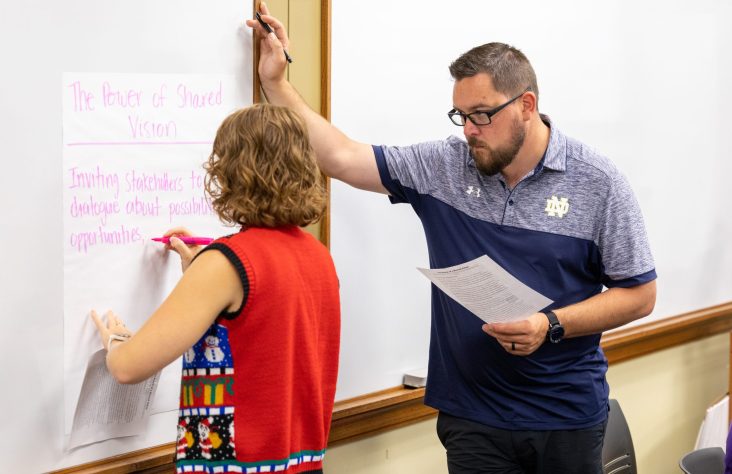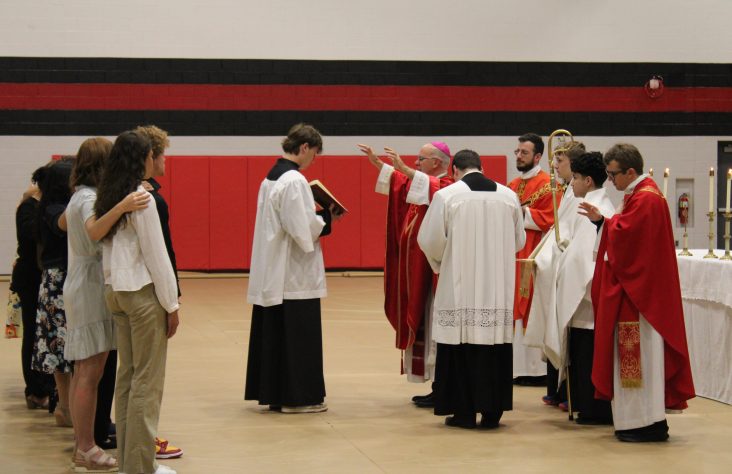February 12, 2018 // Diocese
Planning a Catholic wedding? Processes and considerations
In the Catholic Church, marriage is a sacrament for baptized Christians. As such, the preparations involve several requirements and additional considerations beyond those encouraged within non-Catholic denominations.
For those getting married in the Catholic Church, the U.S. Conference of Catholic Bishops says, the high point of the wedding day is the wedding liturgy, where bride and groom become husband and wife in the lifelong covenant of marriage. Thoughtful, prayerful planning and participation in the Catholic wedding ceremony will bring many blessings to married life.
Pope Francis has given advice to engaged couples about weddings. In his address to engaged couples in Rome, Feb. 14, 2014, he said:
“Make [your wedding] a real celebration — because marriage is a celebration — a Christian celebration, not a worldly feast! … What happened in Cana 2,000 years ago, happens today at every wedding celebration: that which makes your wedding full and profoundly true will be the presence of the Lord who reveals himself and gives his grace. It is his presence that offers the ‘good wine,’ he is the secret to full joy, that which truly warms the heart.
“It is good that your wedding be simple and make what is truly important stand out. Some are more concerned with the exterior details, with the banquet, the photographs, the clothes, the flowers … These are important for a celebration, but only if they point to the real reason for your joy: the Lord’s blessing on your love.”
Aspects of the wedding that couples should consider well ahead of their wedding include:
The Mass or ceremony
Sometimes one of the engaged persons is Catholic while the other is not. For a Catholic to marry a baptized non-Catholic, permission first must be obtained from the bishop, via the vicar general. Then, a decision on whether to have a nuptial Mass must be made in consultation with the pastor or priest involved in the planning process. It is sometimes the case that it would be better to highlight the unity of the couple rather than the differences; and in this case, if the couple had a Mass, the non-Catholic partner would not be able to receive the holy Eucharist (and it is also likely that most of the non-Catholic’s family would not be Catholic). Therefore, it is sometimes sensible for these couples to have the marriage rites outside of Mass, in a Catholic wedding ceremony. If the situation involves a Catholic marrying a non-baptized person, a special dispensation is needed from the diocese and it is not possible to celebrate a nuptial Mass.
If one of the partners is not Catholic and wants to marry in his or her church, then to ensure validity in this situation, the diocese, through the bishop’s authority, must give permission for the Catholic’s marriage to a non-Catholic, and a dispensation for them to marry in a non-Catholic ceremony. For any such marriage questions, couples should consult the pastor.
Timing of the wedding
At a minimum, parishes tend to require that a wedding be scheduled at least six months in advance, thereby allowing time to go over all necessary preparations with the couple. That said, it would be wise for the couple to contact the parish as soon as possible once they know they will be getting married, because ensuring the church is available on your preferred wedding date should come before booking (and making a deposit on) a reception site.
There are seasonal considerations as well. While Catholics are allowed to marry during Advent and Lent, they are not necessarily the best opportunities for overly festive liturgical celebrations. Particularly in Lent, the decorations and music during liturgies should correspond to the more austere nature of the season, which is characterized by penitence and restraint in preparation for the Sacred Triduum. For example, except for certain high feast days in Lent, the altar is not allowed to have floral decoration. Moderate floral decoration is prescribed for Advent as well.
Location
The norm in canon law is that marriages should take place in a church. The church is the house of God and the proper place where the eucharistic liturgy is celebrated with the Christian community. It is not the practice in this diocese to grant outdoor exceptions.
Details within the Mass or ceremony
A wedding is a sacred event, and the music must reflect this fact. Secular music does not belong before, during, or after the rite within the sacred place of the church. Favorite secular or popular songs of the couple belong at the reception or at another time during the wedding festivities that is not associated with the liturgy itself.
Rings are usually exchanged during a nuptial Mass or wedding ceremony because, as proclaimed by the bride and groom within the actual marriage rite, the rings symbolize “love and fidelity.” Gold bands call to mind permanence, purity and beauty within the sacramental union. Moreover, they are given from one spouse to another, attesting to the total gift of self in matrimony.
Notably, there is one popular wedding tradition that has been done away within the Catholic Church. Beyond the fact that they are not part of the marriage rites, “unity candles” are inappropriate for wedding Masses because they draw the connection and focus away from the true source and symbol of unity, the Holy Eucharist, from which the sacrament of marriage flows. The vows and the declaration of consent, coupled with the sacramentals that are the rings, are what publicly and powerfully convey the real union of the spouses in a Catholic wedding. The “unity candle” distracts from this reality. Also, lighting an extra candle that gets blown out at the end of Mass is not an appropriate symbol of covenantal permanence.
Regarding the wedding party, it is preferable to have Catholic witnesses; however, strictly speaking, the witnesses’ function is primarily to attest that the marriage was celebrated. Therefore, they need not be Catholic.
The authorized witness who officiates the liturgy must be a priest or deacon. Parishes may allow outside priests to officiate. However, couples should speak to the parish priest about such things. Also, for any liturgical event, a priest brought in from outside the diocese must officially register with the diocese prior to the event.
It is a longstanding tradition to give a gift to the priest or deacon who celebrates a wedding or another sacrament (such as a baptism). However, the Diocese of Fort Wayne-South Bend has no prescribed fee, and there is no obligation to give any amount. The priest or deacon may keep any gift given to him personally. Checks made out to the parish would go to the church. For wedding liturgies, it is also commonplace to provide some sort of stipend for musicians such as the organist, cantor or conductor (and sometimes for a choir, if one is specially assembled for the event). These rates vary from parish to parish, so please inquire to learn what the practice is at your church.
A lector at a Mass should be a person in full communion with the Catholic Church, a person who is serious about the practice of their faith, and a person who is willing to undergo appropriate preparation for the role. Proclaiming the Scriptures or reading the intercessions is not a role a non-Catholic can take in the Mass, unless the diocesan bishop specifically grants an extraordinary exception to a non-Catholic Christian. However, if the marriage rites are taking place outside Mass, then there would not be any problem with a baptized non-Catholic doing the readings.
Children may participate in a nuptial Mass or wedding ceremony as members of the bridal party (bridesmaid, groomsman, flower girl, ring bearer). Also, if a child is of the appropriate age, is a practicing Catholic and has received the appropriate training, he or she could proclaim a Scripture reading during Mass. Another option is to act as a gift bearer.
After the wedding: marital relations
The Church teaches that every act of sexual love must remain open to the possibility of new life. This is because God has designed sex with both a love-giving and a life-giving purpose, and when couples choose to engage in sex, they must accept the act as God designed it. The only time that the Church approves of artificial birth control is when a woman has been raped, and the possibility exists of preventing the sperm from fertilizing an egg. In this situation, because the woman did not freely choose to engage in sex, she has the right to defend herself from a possible pregnancy. However, if fertilization has already occurred, nothing may be done to prevent the implantation of the newly conceived life in the woman’s womb, or to otherwise disrupt the pregnancy. In addition, sometimes a physician prescribes artificial hormones such as those in the “Pill,” not for the purpose of birth control but to treat or correct an underlying condition in the woman. When used for the purpose of restoring the proper functioning of the body, the Church approves of the use of these artificial hormones.
The Church also approves of methods of natural family planning, which teach couples to observe and interpret the naturally occurring signs of fertility in a woman’s body. The presence or absence of these signs allow couples to identify the days when conception is most likely should they desire to achieve a pregnancy, or to refrain from sexual relations on those days when conception is possible should they desire to avoid a pregnancy. International studies have confirmed that when used to avoid pregnancy, NFP can have an effectiveness rate of 98-99 percent.
Couples marrying in the Diocese of Fort Wayne-South Bend are required to attend a daylong Conference for Engaged Couples, which includes an overview of natural family planning. While it is not required, engaged couples are strongly encouraged to take a complete natural family planning class series, which is offered in either English or Spanish throughout the diocese. For a complete schedule of diocesan NFP classes, go to www.diocesefwsb.org/Natural-Family-Planning. Also listed on this website is the contact information for other organizations that offer natural family planning classes in this diocese.
Other recommended resources on these issues include the website of the U.S. Bishops’ Natural Family Planning Program, which contains explanations of the Church teachings, can be accessed at www.usccb.org/issues-and-action/marriage-and-family/natural-family-planning/catholic-teaching/index.cfm. The For Your Marriage website also features many helpful articles and testimonies on topics related to responsible parenthood and natural family planning, and can be found at www.foryourmarriage.org/?s=family+planning.
Information provided by the Office of Worship.
The best news. Delivered to your inbox.
Subscribe to our mailing list today.






